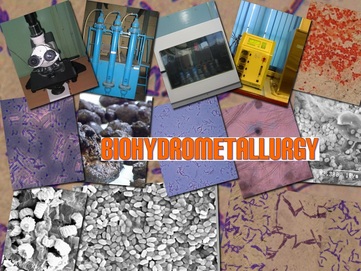My Research Page: Hydro-Biohydro-metallurgy and Waste Recycling

1. Bio-hydrometallurgical Research at CSIR-NML encompasses the strategy for developing an energy efficient and environmentally friendly technological option for extraction of metals from low grade and complex mineral and waste resources/upgradation of poor quality minerals and ores/bioremediation/bioreclamation of metals from waste streams. Research into the role of microorganisms within the metallurgical system and their response to extreme, variable environments is a relatively new field. Our research in this area is focused on finding more robust bioleaching organisms and understanding and monitoring the impact of bioleaching conditions and mineralogy on microbial performance. Using this information, it is possible to identify and promote those conditions within an ore bed that are conducive to microbial growth and activity.
In the recent trends of depletion of high grade ore deposits, it thus becomes necessary to recover mineral resources from low grade ore deposits. However, no appropriate technology is still available for recovery of metals from low- grade deposits. It is an inherent worth of mineral industry to be a potent source of some microorganisms who could remediate their processing hindrances efficiently. This potential of microbes could only be realized globally and efforts are being made to use them for enhanced recovery of mineral resources from natural deposits. This implication of microbial activity in weathering, leaching and deposition of mineral ores could develop into a recent field of biotechnology - biohydrometallurgy. Bioleaching uses microbes to alter the physical or chemical properties of a metallic ore so that the metal can be extracted. The process is at present commercially used for recovery of copper and uranium from low-grade ores in several nations. Laboratory experiments could show that recovery of other metals such as Ni, Zn, Co, Sn, Cd, Mb, Pb, Sb, As and Se from their low-grade ores is also possible through bioleaching ex or in-situ. Besides bioleaching, some microbes are able to enrich metal system (biobeneficiation) or accumulate metals in their cells at concentrations higher than in the surrounding media (bioremediation).
2. Waste Recycling and Replenishment at CSIR-NML encompasses the strategy for developing an energy efficient and environmentally friendly technological option for extraction of base, precious, strategic and rare earth elements metals from secondary resources, mine rejects, process wastes. Our research in this area is focused on finding more robust flowsheets for metal extractions from batteries, process wastes, sludges, slags, red mud, WEEEs, etc.
Key Areas
Hydrometallurgy, Bioleaching, Bioreclamation, Bio-remediation, Biosynthesis, Rare earth Extraction, Battery Recycling
Major Completed Achievements
In the recent trends of depletion of high grade ore deposits, it thus becomes necessary to recover mineral resources from low grade ore deposits. However, no appropriate technology is still available for recovery of metals from low- grade deposits. It is an inherent worth of mineral industry to be a potent source of some microorganisms who could remediate their processing hindrances efficiently. This potential of microbes could only be realized globally and efforts are being made to use them for enhanced recovery of mineral resources from natural deposits. This implication of microbial activity in weathering, leaching and deposition of mineral ores could develop into a recent field of biotechnology - biohydrometallurgy. Bioleaching uses microbes to alter the physical or chemical properties of a metallic ore so that the metal can be extracted. The process is at present commercially used for recovery of copper and uranium from low-grade ores in several nations. Laboratory experiments could show that recovery of other metals such as Ni, Zn, Co, Sn, Cd, Mb, Pb, Sb, As and Se from their low-grade ores is also possible through bioleaching ex or in-situ. Besides bioleaching, some microbes are able to enrich metal system (biobeneficiation) or accumulate metals in their cells at concentrations higher than in the surrounding media (bioremediation).
2. Waste Recycling and Replenishment at CSIR-NML encompasses the strategy for developing an energy efficient and environmentally friendly technological option for extraction of base, precious, strategic and rare earth elements metals from secondary resources, mine rejects, process wastes. Our research in this area is focused on finding more robust flowsheets for metal extractions from batteries, process wastes, sludges, slags, red mud, WEEEs, etc.
Key Areas
Hydrometallurgy, Bioleaching, Bioreclamation, Bio-remediation, Biosynthesis, Rare earth Extraction, Battery Recycling
Major Completed Achievements
- Isolation, characterization and purification of microbial isolates from various sources (22 Industrially important isolates)
- Developed the process for bioleaching of low grade silica-rich and apatite-rich ore of uranium, and tested industrial scale of realization (lab scale to 2ton column scale)
- Developed the know-how for bioleaching of low grade chalcopyrite ore (high recovery with consortia leaching)
- Developed the know-how for Biosorption/bioremediation of tannery effluents (for trivalent chromium source)
- Designed the air-lift bioreactor for large scale bioleaching of sea nodules (using extremophiles)
- Developed microbial based composite for metal remediation from aqueous wastes (product)
- Developed know-how for synthesis of Zn based nanomaterials from zinc tailings (30-60nm ZnO powders, >99% purity)
- Developed know-how for microbial upgradation of iron ore slimes (from 43% Fe to 58% Fe)
- Developed process for bio-desulphurization of high sulfur coal (total sulfur reduction from 3.5% to <0.5%)
- Developed process for extraction of REEs from red mud (95% REOs) hydrometallurgically
- Developed process for extraction of REEs from blast furnace slag (93% REOs) hydrometallurgically
- Postulated process for biochemical dephosphorisation of LD slag (reducing from 1.3 to <0.05% P)
- First Flowsheet globally on bio-recycling of spent electric vehicle lithium-ion batteries
- Developed process for Ammonium Metavanadate (>98%) and Vanadium Pentaoxide (>99%) synthesis from secondary resources (sludge, catalysts, etc.)

